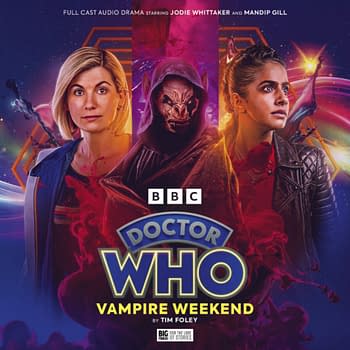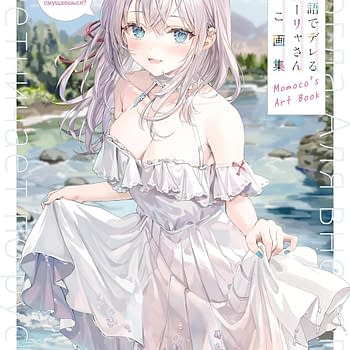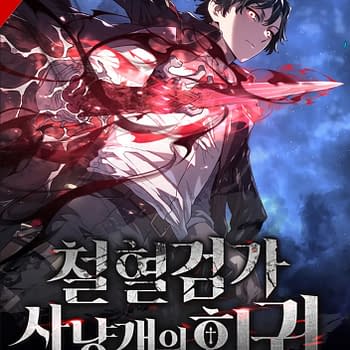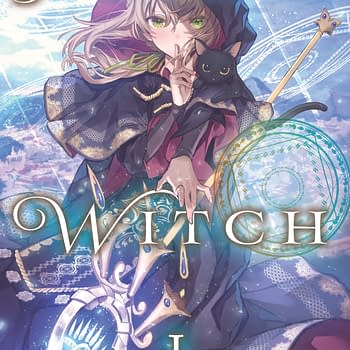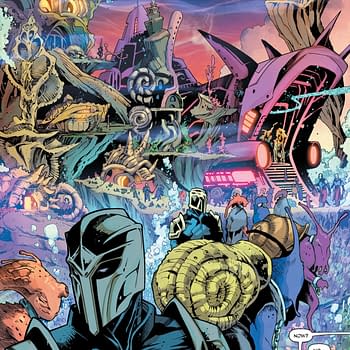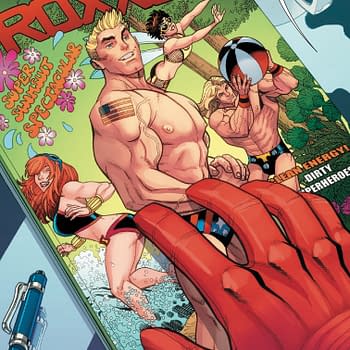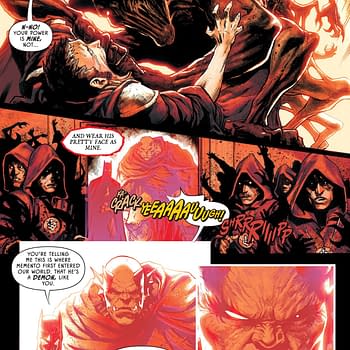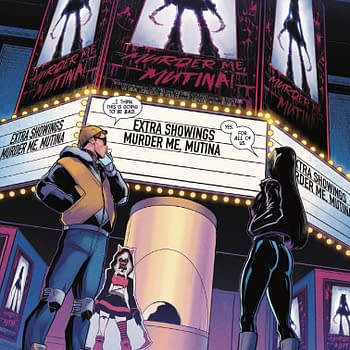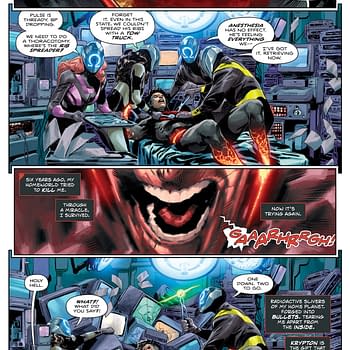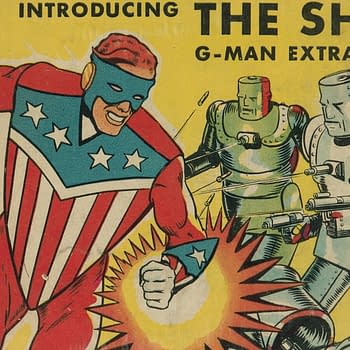Posted in: Comics | Tagged: american dirt, awa studios, jason starr, mexican border, mexico, Red Border, will conrad
"Red Border": Jason Starr and Will Conrad Talk About Their Border Thriller [Interview]
Red Border is one of AWA Studio's launch titles. Crime novelist Jason Starr and artist Will Conrad create a visceral up-to-the-minute thriller about a middle-class Mexican couple on the run from the Cartel. Things do not get better when they reach the US border. In fact, things might be even worse.
AWA released a trailer and interview video for the book, but we also got our own exclusive interview with the creators.
Jason Starr
You have a long career as a crime novelist. What made you decide to write this story as a comic instead of your next novel?
Jason Starr: For me, the idea itself dictates whether it should be a comic or a novel. If it's a visual story, if I can imagine the big "Oh, shit" moments, the set pieces for an artist to draw, the issue-ending cliffhangers, then it should be a comic. If it feels like a story where the internal world is more exciting, where I think it's more interesting inside the character's heads, then I'll see it as a novel. For example, I can't imagine writing my psychological thrillers, such as Cold Caller, Twisted City, or The Follower as comics, because these books depend so much on the psychology of the characters. With Red Border, the subject matter is so inherently visual—the desert, the border, the small Texas town—and there are so many big visual moments and action sequences that I can't imagine it as anything other than a comic.
The Mexican border is a hot button issue these days. Why did you decide on middle-class characters on the run from the Cartel instead of poor migrants?
I lived in Mexico for a while in my twenties, with a middle class family in Guadalajara, and I've always wanted to write about my experiences in some way, and in general I like to write about what I know best. Also, I thought this story would be more complex and provocative if the heroes were progressive, middle class Mexicans, who are caught between the drug war and the migrant crisis, who are idealists, who want a better future for Mexico, and who never expected to find themselves in this situation—on the run from a cartel and having to try to cross the border. It raises a lot of class issues that are very real in Mexico right now, but that we don't hear enough about.
You wrote this series before the current blow-up about cultural appropriation regarding Jeanine Cummins' novel "American Dirt". This is not meant to be a "gotcha" question, but I wonder if you have any thoughts about that. Crime novelists have been able to write characters from other countries and cultural backgrounds all the time. Do you think this is as much about the divide between "high-brow" ie literary books and "Low-brow" ie crime and genre fiction?
Great question because, while Red Border has much different themes than American Dirt, I can certainly see the comparison; there are some provocative issues in Red Border that I expect will stir some controversy. But, to answer the last part of your question first, I've never really understood what "highbrow" vs "lowbrow" fiction really means. To me it's all about whether a work delivers, if it's well executed, if it conveys some truth to the reader, and I think there are certainly many great genre comics and novels that have more "literary" merit than what's generally considered highbrow. As for cultural appropriation, yes I have given this a lot of thought, and to me it's all about empathy. Good writing is about understanding characters, about getting into their heads. It's not just replicating the way characters speak, it's about understanding their attitudes and feelings and conveying this emotion to the reader. I could cite many of examples of writers, from Shakespeare to Elmore Leonard, who have pulled this off brilliantly. If a writer, doesn't pull it off, well that's just not good writing—let's call it lowbrow. No subject or theme should ever be off limits to a writer, but if a writer doesn't write characters from varied cultures with empathy, the end result will come off as fake. In the end, it's a matter of whether the work is truthful or not, if it resonates, if it sings.
Based on the first issue, I already get the impression that Red Border has a more complex political commentary and outlook. Was this conscious? Did you have discussions with the editors about that?
I didn't want to write an overtly political work, but the issues are definitely there. It takes place on the border right now and the issues can't possibly be any more current, but while some political and cultural debate takes place in the comic, I purposely don't take any side or point of view. I didn't write any of this from a liberal or conservative, or American or Mexican point of view. It's totally character-driven. Mainly, I wanted to write an exciting action-horror comic, with big twists, cliffhangers, and shocking moments. I wanted all of the political commentary to be in the subtext and I think the editors at AWA were totally on board with this.
Will Conrad
How did you come to be the artist for Red Border?
Will Conrad: Well, I've been itching to work on something creator owned for a while. When I got in touch with Axel, and we spoke about the what AWA was doing, he offered me the opportunity to do just that. He showed me some outlines, and when I saw the Red Border outline, I had no doubt that this was what I wanted to work on. I loved the outline, the theme and the mood the story could have, and I was sure it would be an instant classic. And also, the chance to work with Jason, which is a great bonus on itself.
Your art here is very realistic, very naturalistic to emphasise the non-fantasy element of the story. Did you have to think about the tone and approach as opposed to a Buffy or Marvel superhero comic?
That was the direction I envisioned for the story. Since it's a story that so many people can relate to, I thought it would be best to keep it more realistic, so we could move away from the regular fantasy stile – which I love doing – but is not the right tone for our story. But despite that, it was not so difficult for me to do the adjustment. I'm used to working with different styles depending on the language I think the story should have.
Was the naturalistic cinematic approach to the art, which feels crucial to the story, something you agreed upon with Jason and the editors?
In a way, I believe that was the reason they wanted me on the story. My storytelling style, even when working with superheroes, is to have a more cinematic approach. I always try to make sure the narrative is clear and compelling, and I believe that the best way to bring the reader into the story is making sure that the art doesn't fight with the script. So, whenever I'm working on the pages, I make sure to share the layouts with the team, so that if they have an input, we can include that on the final art, and the story can be as great visually as it is well written.


!["Red Border": Jason Starr and Will Conrad Talk About Their Border Thriller [Interview]](https://mlpnk72yciwc.i.optimole.com/cqhiHLc.IIZS~2ef73/w:auto/h:auto/q:75/https://bleedingcool.com/wp-content/uploads/2019/12/red-border.jpg)
!["Red Border": Jason Starr and Will Conrad Talk About Their Border Thriller [Interview]](https://mlpnk72yciwc.i.optimole.com/cqhiHLc.IIZS~2ef73/w:auto/h:auto/q:75/https://bleedingcool.com/wp-content/uploads/2019/07/redborderinterior.jpg)



